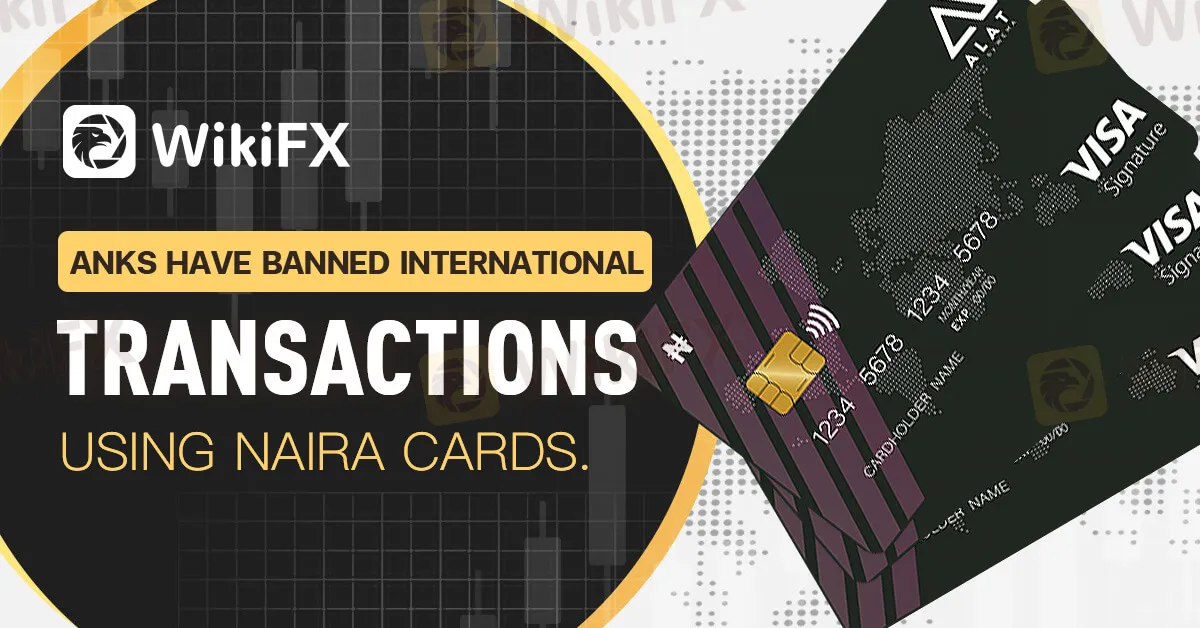简体中文
繁體中文
English
Pусский
日本語
ภาษาไทย
Tiếng Việt
Bahasa Indonesia
Español
हिन्दी
Filippiiniläinen
Français
Deutsch
Português
Türkçe
한국어
العربية
BANKS HAVE BANNED INTERNATIONAL TRANSACTIONS USING NAIRA CARDS.
Abstract:Naira cards will no longer be accepted for international online and Point of Sale (PoS) transactions, according to Nigerian banks, which would reduce the amount that customers using dollar cards may withdraw from foreign ATMs.

Naira cards will no longer be accepted for international online and Point of Sale (PoS) transactions, according to Nigerian banks, which would reduce the amount that customers using dollar cards may withdraw from foreign ATMs.
Customers of several banks have already been informed of the most recent development.
Starting on December 31, 2022, GTBank will no longer accept naira cards for online or point-of-sale transactions.
Customers were notified in a letter from GTCO that they would no longer be able to use their Naira Mastercard for international online and point-of-sale purchases as of December 31, 2022. You may fulfill all of your overseas spending needs using your GTBank dollar card.
This is closely related to the initiative to cut back on American spending abroad and conserve foreign currency for the economy.
On September 30, First Bank of Nigeria Limited banned all overseas transactions using its naira Mastercard.
You will no longer be able to use the Naira Mastercard, Naira Credit Card, our Virtual card, and Visa Prepaid Naira card for international transactions due to current foreign exchange market realities. According to First Bank, this will become effective on September 30, 2022.
In July, Standard Chartered Bank stopped allowing foreign purchases with its naira visa debit card.
Fintech companies have stopped offering virtual card services for cross-border transactions, along with Flutterwave, Eversend, and other fintech platforms.
In March, financial institutions cut the international spending limit on naira cards from $100 to $20 monthly.
Customers received an email from Zenith Bank Plc describing the new international payment plan. The usage of Zenith Bank Naira cards for international Automated Teller Machine (ATM) cash withdrawals and Point of Sale (PoS) transactions has been temporarily stopped, the bank announced.
In addition, the $100 monthly card spending cap for online purchases has been reduced to $20. In reaction to the economic realities of today, this review was written.
Customers of Stanbic IBTC Bank and Standard Chartered Bank Nigeria were urged to apply for dollar or sterling debit or credit cards if they wanted to do transactions with foreign currency.
Banks have, however, limited the total monthly amount of foreign exchange transactions that clients can make using their naira debit or credit cards at ATMs and Point of Sale (PoS) terminals abroad in recent months.
Findings revealed that certain banks had reduced their daily foreign ATM withdrawal limit from the $300 recommended by the Bankers Committee of the Central Bank of Nigeria to $100 because they were unable to find enough dollars to finance the transactions.
The indiscriminate and questionable ways in which some bank clients used their naira debit cards to make purchases abroad in dollars and other foreign currencies had already alarmed the Central Bank of Nigeria (CBN). The CBN had mandated that bank clients who exceeded the $50,000 annual forex limit it established would be implemented, and defaulters sanctioned. This was done to curb forex expenditure abroad.
The CBN also restricted importers carrying a variety of products access to the interbank currency market. The bank claimed that importers could no longer obtain hard currency to pay for 43 commodities, including toothpicks, grains, steel products, and private aircraft, in order to preserve its dollar reserves.
Additionally, customers using naira debit cards to pay foreign business partners are having their payment requests denied by banks.
They now request that payments made to clients abroad be made in the beneficiary's currency rather than in naira. The new process is different from the previous one, in which lenders debited client naira accounts at the current exchange rate and sent funds corresponding to the account of the offshore beneficiary in dollars.

Disclaimer:
The views in this article only represent the author's personal views, and do not constitute investment advice on this platform. This platform does not guarantee the accuracy, completeness and timeliness of the information in the article, and will not be liable for any loss caused by the use of or reliance on the information in the article.
Read more

The Impact of Interest Rate Decisions on the Forex Market
Interest rate changes determine currency attractiveness, influencing capital flows and exchange rate trends. Understanding this mechanism helps investors navigate the forex market effectively.

How a Housewife Lost RM288,235 in a Facebook Investment Scam
A 47-year-old housewife in Malaysia recently fell victim to an online investment scam, losing a substantial sum of RM288,235 after engaging with a fraudulent scheme advertised on Facebook.

Interactive Brokers Launches Forecast Contracts in Canada for Market Predictions
Interactive Brokers introduces Forecast Contracts in Canada, enabling investors to trade on economic, political, and climate outcomes. Manage risk with ease.

Bank Negara Malaysia Flags 12 New Companies for Unauthorised Activity
Bank Negara Malaysia (BNM) has updated its Financial Consumer Alert List (FCA List) by adding 12 more entities, reinforcing its efforts to warn the public against unregulated financial schemes. Check if your broker made the list!
WikiFX Broker
Latest News
The Withdrawal Trap: How Scam Brokers Lure Victims into Paying More
FCA to Investors: Think Twice Before Trusting These Brokers
Trump\s tariffs: How could they affect the UK and your money
Trump gambles it all on global tariffs he\s wanted for decades
TradingView Brings Live Market Charts to Telegram Users with New Mini App
Trump tariffs: How will India navigate a world on the brink of a trade war?
Interactive Brokers Launches Forecast Contracts in Canada for Market Predictions
Authorities Alert: MAS Impersonation Scam Hits Singapore
IG Group Acquires Freetrade for £160M to Expand UK Investment Market
U.S. March ISM Manufacturing PMI Released
Currency Calculator







